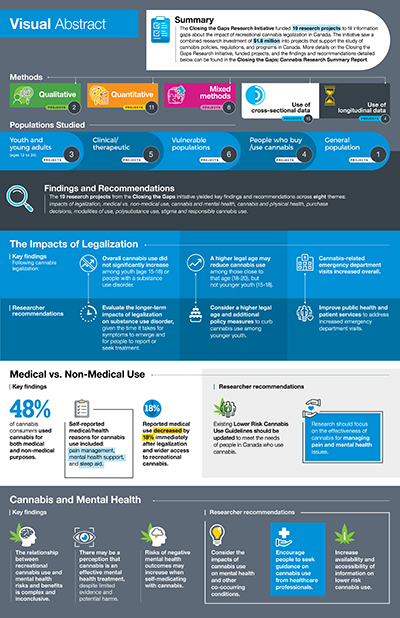
CCSA leads research on the effects of cannabis use, considerations for regulation, and more recently, the impacts of legalization, to help protect the health and safety of people living in Canada and reduce the risk of harms.
With funding from Health Canada, CCSA supported several external research projects on a variety of topics related to cannabis. This research generated a significant amount of evidence, summarized in the tabs below.
As the legal cannabis landscape continues to evolve in Canada, CCSA is playing a key role in advancing measurement of cannabis use patterns and associated harms. We are also involved in establishing a standard THC unit, which will have important implications for measurement, consumer understanding and strengthening lower-risk use guidelines.
Closing the Gaps
Closing the Gaps: Cannabis Research Funded Projects
The Canadian Centre for Substance Use and Addiction (CCSA) funded 19 cannabis research projects on subjects ranging from cannabis legalization and mental health to a comparison of legal versus illicit cannabis sales.
With Health Canada’s support, each project received funding of up to $100,000 over two years. The Mental Health Commission of Canada contributed an additional $100,000 to support awarded projects with a mental health focus for a combined research investment of $1.8 million.
Summary of Findings
We created a Visual Abstract and a Summary Report once the funded projects were complete. Both resources summarize some of the key findings of the 19 Closing the Gaps studies, focusing on the following topics:
- Impact of legalization
- Medical use versus nonmedical use
- Mental and physical health effects
- Purchase decisions
- Modalities of use
- Polysubstance use
- Stigma
Click on the image to see the full visual abstract.
Project Summaries
Addressing Potential Negative Impacts from Cannabis Legalization Self-Directed Intervention for Cannabis Misuse
University of Calgary
Funding recipient: David C. Hodgins
Priority area: Impact of cannabis legalization
The aim of this study is to pilot the clinical use of a brief, self-directed intervention for individuals with problematic cannabis use who wish to recover with minimal professional support. A remotely offered intervention for this population of individuals could fill an important role within an integrated public health approach.
Bridging the Gap: Veterans and Recreational Cannabis Use
University of Alberta
Funding recipient: Dr. Suzette Brémault-Phillips
Priority area: Cannabis use in priority/marginalized populations
This study aims to address the significant knowledge gap about medical vs. recreational cannabis use by Canadian veterans, and to better understand the benefits and possible harms of this use to them and their families.
Cannabis and Polysubstance Use
University of British Columbia
Funding recipient: Dr. Christian Schütz
Priority area: Polysubstance use
This study will investigate the risks and potential benefits of THC and CBD use among individuals with severe polysubstance use. The study will consist of a systematic review, participant interviews and a pilot study testing CBD.
Cannabis Use Among Indigenous Peoples of Turtle Island: Motives for Use, Substitution and Impacts of Legalization
University of British Columbia
Funding recipient: Dr. Lindsay Farrell and Dr. Zach Walsh
Priority area: Cannabis use in priority/marginalized populations
The study aims to broaden our understanding of the motives for cannabis use among First Nations individuals living in British Columbia and Alberta. It will emphasize assessing both risk for problematic use and potential benefits of therapeutic use for symptoms of chronic pain, anxiety and sleep disorder.
Changes in Substance Use and Mental Health in Two Hospital-Based Addiction Treatment Programs Over the Course of Recreational Cannabis Legalization in Canada
Homewood Research Institute
Funding recipient: Dr. Jean Costello
Priority area: Mental health
This project will explore associations among cannabis use, other substance use and common psychiatric symptoms. The study will use two clinical samples of patients entering treatment for substance use disorder or concurrent disorders.
Choice Modelling Study to Explore Canadian Consumer Preferences for Attributes of Cannabis Products and Purchase Experiences
Memorial University
Funding recipient: Dr. Jennifer Donnan
Priority area: Impact of cannabis legalization on illegal cannabis purchase and supply
The goal of this study is to get a deeper understanding of consumer preferences for the different varieties of cannabis products. It will also gather data from across Canada and compare consumer preferences in relation to different provincial policies and cultures.
Evaluating the Short-Term Impacts of Cannabis Legalization on Alcohol Consumption, Co-occurring Cannabis and Alcohol Consumption, and Alcohol Consequences Among Adolescents and Adults in Ontario
Centre for Addiction and Mental Health
Funding recipient: Dr. Sameer Imtiaz
Priority area: Polysubstance use
This study will examine the impacts of cannabis legalization on alcohol consumption, co-occurring cannabis and alcohol consumption, and alcohol consequences based on population-based surveys and health administrative databases of adolescents and adults in Ontario.
An Examination of the Sex-Specific Psychophysiological Markers of Risk for Physical and Mental Health Problems Across Modes of Cannabis Use
St. Francis Xavier University
Funding recipient: Dr. Kara Thompson
Priority area: Mental health
This study will investigate psychophysiological markers of risk for physical and mental health disorders across different modes of cannabis administration. It will include sex- and gender-specific impacts on cannabis use practices and effects using a sample of young adults.
A Gender- and Age-Based Analysis of Cannabis Use for Pain and Mental Health in a Large Canadian Naturalistic Sample
McMaster University
Funding recipient: Dr. Benicio Frey
Priority area: Mental health
The aim of this study is to conduct age- and gender-based analyses on the profile of cannabis use for pain and mental health conditions within a large, naturalistic sample of Canadians.
Health Warnings, Product Labelling Regulations and Consumer Understanding of the Health Risks of Cannabis
University of Waterloo
Funding recipient: Dr. Samantha Goodman and Dr. David Hammond
Priority area: Impact of cannabis packaging and labelling requirements
The project will use survey data from the International Cannabis Policy Study to examine changes in knowledge and perceptions of health risks before and after non-medical cannabis legalization, as well as the effectiveness of the health warnings implemented on Canadian cannabis products and their impact on knowledge of cannabis health risks.
The Impact of Accurate Knowledge about Vaping and Public Health Initiatives on Cannabis Use Habits of Emerging Adults
Dalhousie University
Funding recipient: Dr. Igor Yakovenko
Priority area: Vaping
This project will look at what knowledge emerging Canadian adults have about vaping cannabis and whether this information is considered trustworthy or accurate by this population. Researchers will also look at whether this information can be used to predict lower perceptions of harm from vaping, which in turn can lead to greater substance use problems.
Impacts of Canada’s Recreational Cannabis Legalization on Youth Cannabis Use and Medical Cannabis Consumption
Memorial University
Funding recipient: Dr. Hai V. Nguyen
Priority area: Youth cannabis consumption
This study will investigate the effects of recreational cannabis legalization in Canada on recreational cannabis use among youth and medical cannabis consumption.
Public Health Outcomes of Cannabis Supply Sources: Examining the Evidence among Quebec Cannabis Consumers
Centre Hospitalier de l’Université de Montréal
Funding recipient: Dr. Didier Jutras-Aswad
Priority area: Cannabis use in priority/marginalized populations
This project aims to determine whether the source of cannabis supply reported by Quebecers is associated with specific patterns of cannabis use and increased vulnerability to cannabis-related harms such as problematic cannabis use, mental health problems and cannabis-impaired driving.
Transitioning to the Legal Cannabis Market in Canada
University of Waterloo
Funding recipient: Elle Wadsworth and Dr. David Hammond
Priority area: Legal vs illegal cannabis market
The objective of this study is to examine sources of cannabis purchases in Canada, including legal and illegal retail sources, and the policy- and individual-level factors associated with purchasing patterns and transitioning to the legal market.
Understanding Cannabis-Related Physical and Mental Health Presentations to the Emergency Department Following Legalization of Non-Medical Cannabis Use
Dalhousie University and Nova Scotia Health
Funding recipient: Dr. Philip G. Tibbo
Priority area: Healthcare service impacts of cannabis use
The project aims to investigate patients coming into contact with the emergency department due to adverse events, both medical and mental health side effects, related to cannabis use.
Understanding the Relationship Between Recreational Cannabis Use and Mental Health in a Marginalized Population
University of British Columbia
Funding recipient: Dr. Alasdair M. Barr
Priority area: Mental health
This project will explore the relationship between cannabis use and mental health in a marginalized population on Vancouver’s Downtown Eastside. Researchers will conduct a series of mental health assessments and obtain highly detailed information about why individuals use cannabis, what type of cannabis they use and patterns of use.
Understanding Cannabis Use and Perceptions in Patients with Mood and Anxiety Disorders
Centre for Addiction and Mental Health
Funding recipient: Dr. Stefan Kloiber
Priority area: Mental health
This study aims to assess patterns, effects, perceptions and motivations of cannabis use in adults with mood and anxiety disorders. The study will be performed through an anonymous online survey and patient focus groups and interviews.
Understanding Responsible and Harmful Cannabis Use
Carleton University
Funding recipient: Dr. Michael Wohl
Priority area: Problematic cannabis use and cannabis use disorder
This project will address the existing gaps in knowledge about responsible cannabis use strategies and social psychological predictors of engagement in responsible vs. harmful cannabis use. It also aims to develop a reliable and valid tool to measure responsible cannabis use beliefs and behaviours.
Wading through the Weeds: A Public Health Response to Supporting Pregnant and Breast/Chest Feeding People Who Consume Cannabis
McMaster University
Funding recipient: Dr. Saara Greene
Priority area: Cannabis use in priority/marginalized populations
This study aims to contribute to the development of culturally responsive public health practices and policies that reflect the needs and experiences of Black, Indigenous and People of Colour (BIPOC), and parents who have child welfare involvement, who consume cannabis during pregnancy and are breast/chest feeding.
Closing More Gaps
Closing More Gaps
This initiative was an extension of the Closing the Gaps funding stream to further explore knowledge gaps around the impact of legalization of non-medical cannabis on public health and safety.
Project Summaries
La Publicité et la Communication Promotionnelle par Internet de l’industrie Canadienne du Cannabis
The Physical Availability of Cannabis Stores and Cannabis Use and Harms: A Systematic Review
Partnerships in Cannabis Policy Evaluation
Partnerships in Cannabis Policy Evaluation (PCPE) Grants
To meet the need for research to inform policy and regulatory models for non-medical cannabis use, CCSA and the Canadian Institutes for Health Research Institute of Neurosciences, Mental Health and Addiction (CIHR-INMHA) created the Partnerships for Cannabis Policy Evaluation (PCPE) funding opportunity.
The program, funded by CCSA, was developed under CIHR’s Integrated Cannabis Research Strategy. It supported projects that evaluated and monitored the implementation and impact of cannabis-related policies at the provincial and territorial levels, to identify best practices from public health and safety perspectives.
See the links below …
- To learn about the research projects undertaken by the five funded teams
- To access What We Heard: Knowledge Exchange Interim Report
- To access What We Heard: End-of-Grant Knowledge Exchange Report




